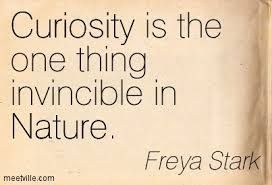Curiosity (from Latin curiosus "careful, diligent, curious," akin to cura "care") is a quality related to inquisitive thinking such as exploration, investigation, and learning, evident by observation in human and many animal species. The term can also be used to denote the behavior itself being caused by the emotion of curiosity. As this emotion represents a thirst for knowledge, curiosity is a major driving force behind scientific research and other disciplines of human study.
Causes
Although many living beings have an innate capability of curiosity, it should not be categorized as an instinct because it is not a fixed action pattern; rather it is an innate basic emotion because, while curiosity can be expressed in many ways, the expression of an instinct is typically more fixed and less flexible. Curiosity is common to humanbeings at all ages from infancy through adulthood, and is easy to observe in many other animal species. These include apes, cats, and rodents.
Brain
Although the phenomenon of curiosity is widely regarded, its neural correlates still remain relatively unknown. However, recent studies have provided insight into the neurological mechanisms that may be associated with curiosity, such as learning, memory, and motivation. Such research aims to transition the study of curiosity from a speculative realm to one of more scientific credibility. Various theories have been proposed in order to elucidate the mechanism of curiosity:
"Curious" redirects here. For other uses, see Curious (disambiguation) and Curiosity (disambiguation). For the Mars rover, see Curiosity (rover).




